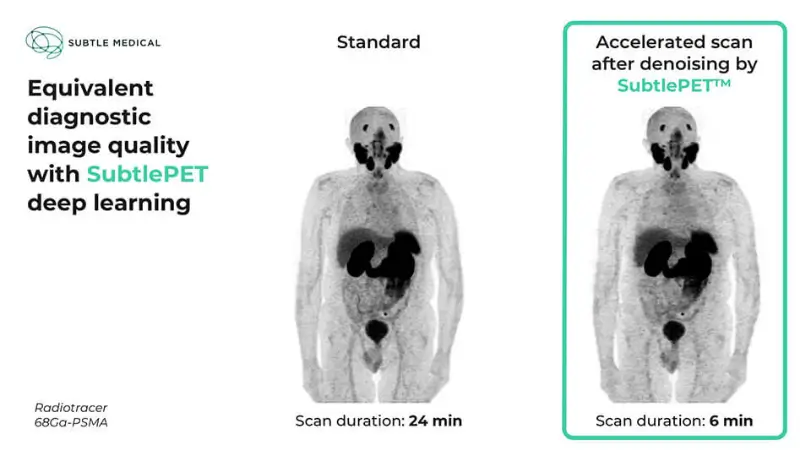SubtlePET™
AI solution for PET scan optimization
SubtlePET™ is an AI solution that enables nuclear medicine centres to reduce acquisition time on existing machines or reduce the dose injected.

Validated for a large number of tracers
SubtlePET™ is intended for use with PET images acquired using the following radiotracers: 18F-FDG, 18F-amyloid, 18F-DOPA, 18F-Choline, 18F-DCFPyL, Ga-68 Dotatate, and Ga-68 PSMA.
Reduced acquisition time
SubtlePET™ can increase the quality of images acquired faster. The resubmitted SubtlePET™ image is of standard clinical quality.
Reduction of the injected dose
SubtlePET™ makes it possible to increase the quality of the images
obtained with a lower injected dose². The SubtlePET™ resubmitted image is of standard clinical quality
Compatible with most PET scanner models
SubtlePET™ delivers the enhanced PET series directly into the nuclear medicine specialist’s interpretation tool and thus integrates seamlessly into the existing infrastructure.
Improve the flexibility of your service in manage unforeseen events or needs (machine breakdowns, delivery times, add patient...) more easily
Improve patient comfort and experience by reducing the time spent at the machine
Optimize the use of more expensive tracers (18F-DCFPyL, 18F-DOPA, 18F-amyloid,...)
Save time, secure your diagnosis and optimize your workflow with Incepto
Publications
-
Clinical and phantom validation of a deep learning based denoising algorithm for F‑18‑FDG PET images from lower detection counting in comparison with the standard acquisition - EJNMMI Physics (2022). DOI:10.1186/s40658-022-00465-z
-
Artificial intelligence for reduced dose 18F-FDG PET examinations: a real-world deployment through a standardized framework and business case assessment. EJNMMI Physics, 2021. DOI: 10.1186/s40658-021-00374-7
-
Artificial intelligence‑based PET denoising could allow a two‑fold reduction in [18F]FDG PET acquisition time in digital PET/CT. EJNMMI 2021 - DOI :10.1007/s00259-022-05800-1
Regulatory
Contact us to know if this product is available in your country.

